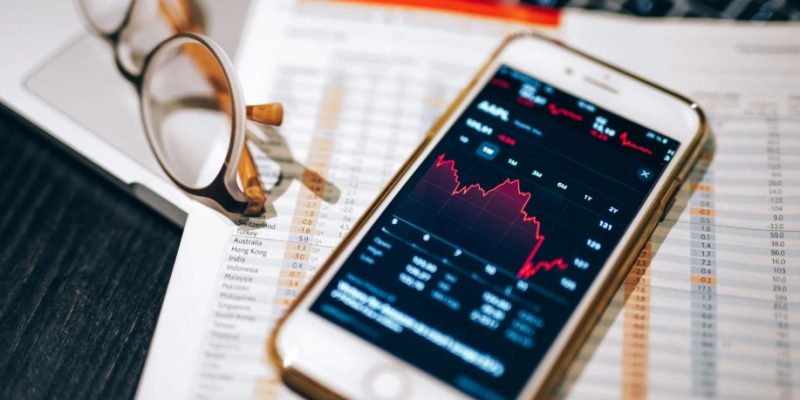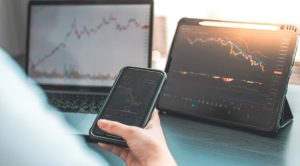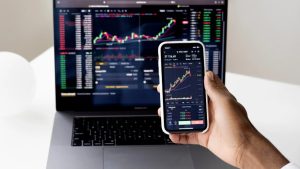
A New Era of Financial Markets
The last two decades have really dramatically changed the financial scenario, with mobile trading platforms becoming a significant force in this change.
The proliferation of smartphones and high-speed connectivity has allowed investors to trade globally with a few taps on their phones.
Until recently, trading was limited to the desktop and brokerage houses, but mobile trading platforms brought all this to their fingertips.
Electronic trading has opened the financial markets to all types of traders, both institutional and retail and permits them to trade anytime, anywhere.
This phenomenon has been fueled by innovation in app development, artificial intelligence-driven analytics and real-time data streaming, enabling traders to make decisions anywhere, anytime, based on informed insights.
How Mobile Trading Has Changed the Investment?

The development of mobile trading has dramatically changed how investors interact with the market.
Previously, trading was done by calling a broker or accessing a trading terminal on a desktop computer.
With mobile trading platforms, investors can open, manage and close positions with a button.
This ease of access has led to greater participation in the market, especially among young traders who seek convenience and speed.
The mobile trading platforms also provide functionalities such as auto trading, price alert push notifications and advanced charting tools so users can stay in line with market action.
The Development of Advanced Trading Applications
Trading platforms have developed from straightforward interfaces into advanced platforms with state-of-the-art technologies.
Modern mobile trading applications have real-time analysis, AI-based insights and social trading features where users can observe and emulate seasoned investors’ trades.
Platforms like MetaTrader and proprietary broker programs incorporated advanced charting tools, risk management parameters and order execution with ease.
Of these, mt5 has become very popular because of its ability to trade multiple assets with faster execution and better analysis tools, rendering it a choice among retail and institutional traders.
Securities and Regulation of Trading
With mobile trading becoming increasingly popular, security has become a high-priority concern among regulators and trading platform providers.
The growth in cyber threats has forced trading applications to adopt multi-layered security, encrypted payments and fingerprint/pattern lock login mechanisms.
In addition, financial regulators worldwide have implemented rigorous compliance procedures to protect traders against scams.
Regulated sites must fulfil Know Your Customer (KYC) and Anti-Money Laundering (AML) requirements to guarantee that users trade in a transparent and secure environment.
The Use of AI and Automation in Mobile Trading

Artificial intelligence and automation technologies have transformed mobile trading platforms by bringing predictive analytics, algorithmic trading and real-time risk management tools onboard.
AI-powered bots can sift through vast volumes of data in seconds and give traders insights that may take several hours to pull together manually.
Automated trading programs enable users to define pre-set conditions to make trades without continuous personal input.
These features are more efficient and reduce emotional decision-making, which tends to result in trading mistakes.
Comparing Mobile Trading Platforms
With so many trading platforms, traders consider several factors when shopping for a platform.
Easy-to-use interfaces, low latency trading and multiple asset classes available are significant factors determining a platform’s success.
Moreover, traders also desire applications that have smooth integration between devices.
Being able to transition between a mobile application and a desktop version of the application without losing data is very important to professional traders who need to be flexible in handling their positions.
The Impact of Mobile Trading on Financial Market Volatility
Market volatility has been brought about by new dynamics with the emergence of mobile trading.
With a large pool of retail traders actively engaging with financial markets, sudden price fluctuations are more common.
The convenience introduced by mobile platforms implies that traders can respond instantly to breaking news, economic data and social media sentiments, amplifying market price fluctuations.
Flash crashes, long an exception, are increasingly occurring because of high-speed and algorithmic trading performed through mobile platforms.
With mobile trading widening its reach, regulators and financial institutions must evaluate its effects on general market stability and take measures to counteract excessive volatility.
The Role of Mobile Trading in Emerging Markets
Mobile trading has also been instrumental in increasing financial market access in emerging markets.
Traders in developing economies often cannot access mainstream brokerage services, but mobile platforms fill this void by providing an affordable, accessible alternative.
With fewer entry barriers, investors in Africa, Southeast Asia and Latin America increasingly participate in world markets.
This has created excellent opportunities in financial literacy and wealth creation. As mobile trading expands, its role in economic inclusion and bridging financial gaps will become more evident.
The Future of Mobile Trading Platforms
With ongoing technological advancements, the mobile trading platforms of the future hold great promise.
Blockchain-based trading, augmented reality (AR) analytics and decentralized finance (DeFi) are innovative technologies anticipated to transform the trading experience.
Additionally, growth in 5G technology will continue to increase mobile trading speed and reliability, lowering latency and order execution times.
With increasingly more interconnected financial markets, mobile trading will increasingly define the future of finance globally.
The Ongoing Evolution of Trading

The era of mobile trading platforms has transformed the financial arena by granting investors greater access to markets and innovative tools than ever before.
With each technological advance, traders will see increasingly advanced features designed to maximize their capacity to make real-time informed decisions.
With security, artificial intelligence and automation leading the way, mobile trading will become increasingly more robust in the years ahead.
Those who adopt these technologies will possess the edge they need to master the sophistication of new financial markets successfully.





